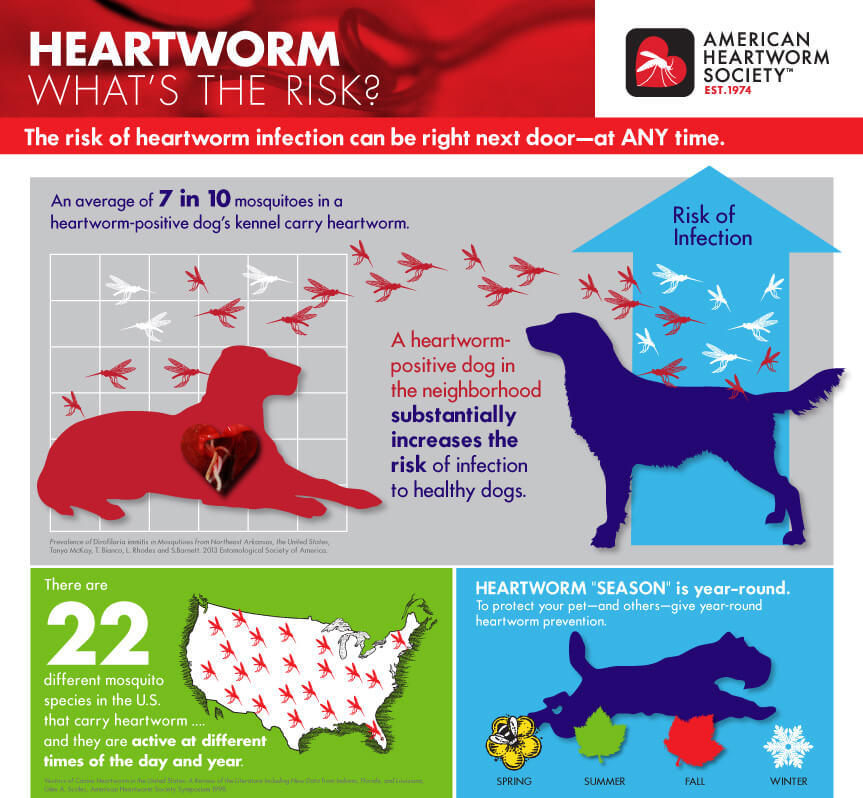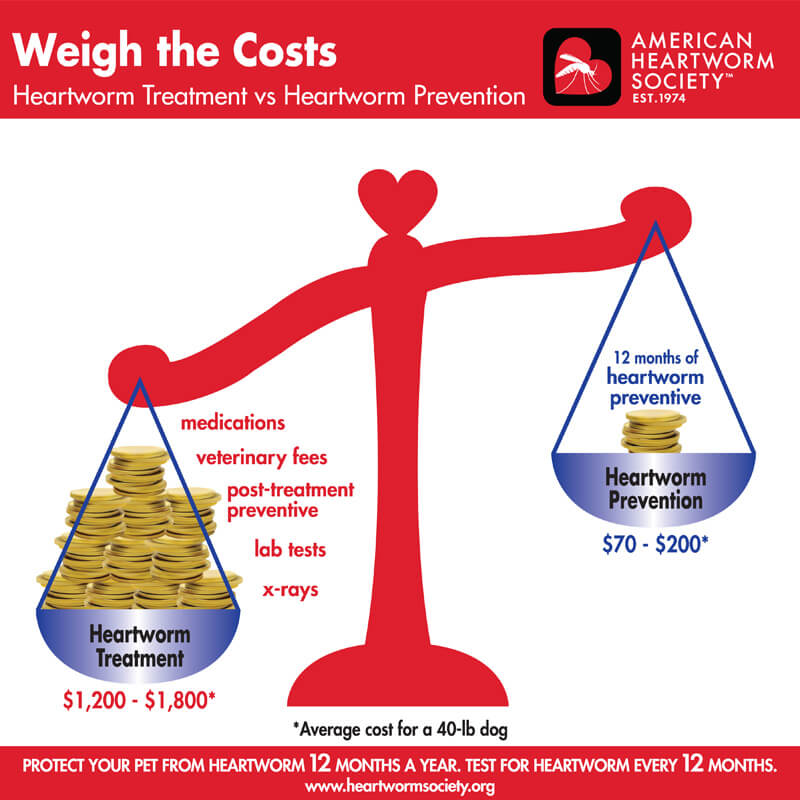
A MESSAGE TO TAKE TO HEART
It’s that time of year again, friends. It’s time to raise awareness about a serious and potentially fatal pet disease. Heartworm disease is caused by worms that live in the heart, lungs and associated blood vessels of affected pets. The presence of these, often foot-long worms can cause severe lung disease, heart failure and damage to other organs in the body. The American Heartworm Society reports that more than one million dogs currently have heartworm disease. They also report that heartworm is a serious canine and feline health concern that threatens animals in all 48 contiguous states and Hawaii, as well as throughout the temperate regions of the world.
Transmission
It only takes a single bite from a mosquito for your pet to contract heartworm disease. Contrary to popular belief, heartworm season is also not limited to summer months only. While the risk of infection in dogs varies from one region of the country to another and even from one community to another, one fact remains: heartworm disease is a threat to unprotected dogs in every state.
Unprotected dogs, foxes, coyotes, and wolves act as reservoirs, or sources, for the spread of this serious disease.
Furthermore, unprotected dogs traveling with their owners to areas where heartworms exist will be at risk for heartworm exposure. Heartworm disease is a complicated and deadly illness—the best approach is prevention.

SIGNS OF HEARTWORM DISEASE
Some dogs can be infected for several years before symptoms develop, so heartworm disease in younger dogs may not be obvious. As heartworms slowly cause damage to the pulmonary arteries of the lungs, signs of disease may include a mild persistent cough, reluctance to exercise, fatigue after moderate activity, decreased appetite, and weight loss. Eventually, as blood flow through the diseased lungs becomes more restricted, some dogs can develop heart failure. This is commonly recognized by a buildup of fluid in the abdomen and the appearance of a “swollen belly.”
Although less common, a large number of heartworms can lead to a sudden obstruction of blood flow through the heart and lungs. This blockage often becomes a life-threatening form of heart failure referred to as caval syndrome. Signs of caval syndrome often include a sudden onset of labored breathing, pale gums, dark red or “coffee-colored” urine, and an inability or unwillingness to move. Most dogs suffering from caval syndrome will not survive without prompt surgical removal of the heartworm blockage.
DETECTING HEARTWORM INFECTION
Numerous blood tests are available for detecting heartworm infections in dogs and cats.
WHO SHOULD BE TESTED?
Annual testing is recommended for all dogs to ensure that heartworm prevention is achieved and maintained. If an infection is diagnosed in its early stages, the disease may be less severe and easier to treat.
All dogs 7 months of age and older should be tested for heartworms prior to beginning a preventive program..
PREVENTION

Heartworm preventive medications are very effective when given properly on the prescribed schedule. It is important to monitor your pet’s weight to ensure your pet falls within the weight range listed on the package. All approved heartworm preventives are typically safe, very easy to use, relatively inexpensive, and some provide treatment for additional parasites. Prevention is always safer and more affordable than treating adult heartworm infections.
TREATMENT
Without treatment, heartworm disease will worsen and may lead to more serious illness. Unless medical reasons identify a dog as a poor candidate, heartworm-positive dogs should be treated. Treating dogs for heartworms can also lead to serious health concerns, however, as the dead parasites can cause further injury to the lungs and pulmonary arteries. A thorough physical examination, x-rays, and blood and urine tests may be needed prior to treatment to assess your dog’s level of risk. While the heartworm medication melarsomine hydrochloride is extremely effective in eliminating adult worms, some dogs will not be completely cleared with a single course of treatment. Testing is recommended 6 months after treatment to ensure all heartworms were killed. If tests are still positive, additional testing and further treatment may be indicated.
Routine testing is critical to avoid a delay in detecting early infection and starting life-saving therapy.

